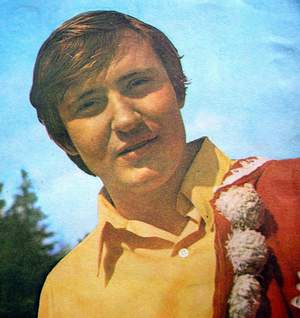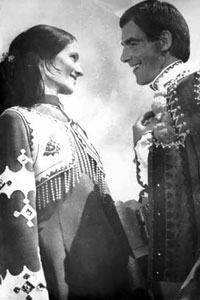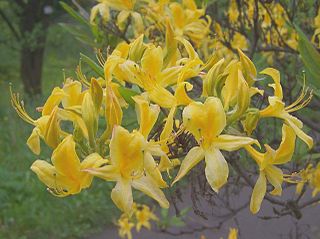
Sofiia Mykhailivna Yevdokymenko-Rotaru, known simply as Sofia Rotaru, is a Ukrainian pop singer of Romanian origin.

Ukrainian rock is rock music from Ukraine.

TNMK or Tanok na Maidani Kongo - is the most successful Ukrainian hip-hop group. They are known for clever, yet often tongue-in-cheek, lyrics; mixing hip-hop with rock, funk and jazz music and playing real instruments on their albums and live shows, rather than using samples and drum machines. TNMK performed at many festivals as: Sziget Fest, Zakhid, Tavria Games, Chervona Ruta, Faine Misto and Bandershtat.

Volodymyr Mykhailovych Ivasyuk was a Ukrainian songwriter, composer and poet. He is the author and composer of the widely popular song "Chervona Ruta" popularized by Sofia Rotaru in 1971, and later covered by other singers.
"Chervona Ruta" is a popular Ukrainian song written by Volodymyr Ivasyuk in 1968 and performed by many singers. The song was never formally copyrighted and due to its wide popularity is considered a Ukrainian folk song. It is named after a mythological flower, the chervona ruta, which if found turning a red colour by a young girl, was meant to bring happiness in love.
Nazariy Nazarovych Yaremchuk was a Hutsul Ukrainian singer, born in the village of Rivnya, Chernivtsi Oblast. He was posthumously named Hero of Ukraine in August 2021.
Pop music in Ukraine is Western influenced pop music in its various forms that has been growing in popularity in Ukraine since the 1960s.

Chervona Ruta is a 1971 Soviet Ukrainian musical film written by Miroslav Skochilyas and directed by Roman Oleksiv, starring Sofia Rotaru and Vasyl Zinkevych alongside popular Soviet Ukrainian ensembles.

Where Has Love Gone? is a 1980 Soviet musical drama film written and directed by Valeriu Gagiu starring Sofia Rotaru as well as Valeriu Gagiu and Evgueny Menishov. The movie features songs performed by Sofia Rotaru, sequence of substantial dialogues. The setting includes Moldavian landscape and countryside life as well as Black Sea coast, Chişinău and Odessa.
Monologue of Love is a Soviet Ukrainian musical telefilm, written by Grigore Vieru and directed by Larisa Maslyuk, starring Sofia Rotaru in the main role. The movie filmed at Ukretelefilm in Crimea, Kazakh SSR and Lithuanian SSR, features the new conception in the Soviet musical telefilms: substantial poetry monologues recited by Sofia Rotaru on themes associated with love, followed by thematic songs and corresponding natural geographical and theatrical scenic setting.
The discography of Sofia Rotaru.

Chervona ruta (Monarda) may refer to a mythological or actual species of flowering plants in the rue genus of the citrus family, Rutaceae, or the rhododendron genus of the heath family, Ericaceae.
Chervona ruta is a flower featuring in Ukrainian legend.

Vasyl Ivanovych Zinkevych is a Soviet and Ukrainian singer, actor, dancer and costume designer. Alongside Nazariy Yaremchuk, Sofia Rotaru and Volodymyr Ivasyuk, Zinkevych was one of the faces of the Ukrainian roots revival music of the 1970s.
Anatoliy Kyrylovych Yevdokymenko was a Ukrainian musician, director of Chervona Ruta. He is a People's Artist of Ukraine, husband of Sofia Rotaru.
Sidi L'vovna Tal' or Sidy Thal was a prominent, popular Jewish singer and actress in the Yiddish language, born in Czernowitz, Austria-Hungary. She worked in Romania and in the USSR. She and her husband, Pinkus Falik, encouraged and helped the start of the career of the Ukrainian pop singer Sofia Rotaru. Sidi Tal worked at the Chernivtsi Philharmonic until the late 1970s, singing and performing comical, dramatic, and satiric scenes, monologues, and sketches. She also worked with young non-Jewish actors in the Philharmonic, teaching them movement and staging. Some of her students later became superstars of the Soviet popular stage. Throughout her career at the Philharmonic, Sidi Tal and her group toured all over the country and traveled to Hungary and Romania. Her repertoire included works of such Chernivtsi authors as Eliezer Steinbarg and Motl Saktsier. The music to some of the songs she sang was written by Chernivtsi composers Leibu Levin and Leonid Zatulovskiy.

Sofia Rotaru and Chervona Ruta is a 1981 studio album by Sofia Rotaru, recorded at Melodiya in the USSR. It is packaged together with Where Has Love Gone?, the film soundtrack for Where Has Love Gone?.
VIA is an abbreviation for Vocal and Instrumental Ensemble. It is the general name used for pop and rock bands that were formally recognized by the Soviet government from the 1960s to the 1980s.
Chervona Ruta is a permanent biennial all-Ukrainian youth festival of contemporary song and popular music, which has been held every two years since 1989. It was a benchmark where more Ukrainian popular music was presented transitioning away from traditional Ukrainian folk culture associated with "sharovary" genre. Unlike the Soviet festival Song of the Year where only a selected song from Ukraine sometimes was demonstrated, Chervona Ruta allowed more singers and songs.
"Kray, miy ridniy kray" is a song originally recorded by Sofia Rotaru for her 1981 album Sofia Rotaru and Chervona Ruta.









